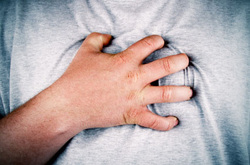Treatment for Panic Attacks in Halifax
Psychologists can help reduce panic attacks

Fed up with panic attacks? Help is available in Nova Scotia.
If you are experiencing panic attacks you are not alone - this is a very common anxiety-related problem.
The lifetime prevalence of Panic Disorder (at a clinical level of severity) typically ranges between 1.5% and 3.5%. Of course, the number of people who experience panic attacks that are not at a clinical level in terms of intensity or frequency is even higher. The good news is that panic attacks are highly treatable.
If you are experiencing panic attacks you are not alone - this is a very common anxiety-related problem.
The lifetime prevalence of Panic Disorder (at a clinical level of severity) typically ranges between 1.5% and 3.5%. Of course, the number of people who experience panic attacks that are not at a clinical level in terms of intensity or frequency is even higher. The good news is that panic attacks are highly treatable.
What are the symptoms of a panic attack?
Panic attacks are often defined as a sudden, unexpected episode of intense fear that appears to come “out of the blue” with no identifiable cause. The attack usually lasts only a few minutes, but it certainly feels much longer than this when it is happening.
During a panic attack, symptoms can include:
● Shortness of breath
● Heart palpitations or increased heart rate
● Feeling faint or worried about passing out
● Difficulty swallowing or a sense of choking
● Increased perspiration
● Nausea or upset stomach
● Feelings of being disconnected from one’s body
● Tingling in hands or feet
● Hot or cold flashes
● Chest pain combined with a fear of having a heart attack
● Fears of “going crazy” or losing control of one’s behavior
Note that not all of these symptoms will be present during a panic attack. To receive a diagnosis of Panic Disorder, someone must have had two or more panic attacks followed by at least one month of persistent worry about having additional panic attacks.
During a panic attack, symptoms can include:
● Shortness of breath
● Heart palpitations or increased heart rate
● Feeling faint or worried about passing out
● Difficulty swallowing or a sense of choking
● Increased perspiration
● Nausea or upset stomach
● Feelings of being disconnected from one’s body
● Tingling in hands or feet
● Hot or cold flashes
● Chest pain combined with a fear of having a heart attack
● Fears of “going crazy” or losing control of one’s behavior
Note that not all of these symptoms will be present during a panic attack. To receive a diagnosis of Panic Disorder, someone must have had two or more panic attacks followed by at least one month of persistent worry about having additional panic attacks.
How are panic attacks treated?
Of the anxiety disorders, Panic Disorder is arguably the one with the greatest likelihood of treatment success. Just as panic attacks are learned, they can also be unlearned with the proper intervention. Treatment includes:
● Learning specific skills to manage and reduce the intensity of a panic attack when it happens (e.g., proper breathing exercises)
● Keeping track of when and where the attacks happen ("out of the blue" is a myth - there really are triggers for panic attacks)
● Learning helpful relaxation and stress management strategies
● Identifying behaviors that keep panic in your life (many of the things we do to deal with panic actually increase the likelihood of an attack)
● Recognizing, challenging, and replacing thoughts that lead to panic attacks
● Gradual exposure to situations in which panic attacks may occur while using specific strategies to prevent panic from occurring (panic lives on
fear – when fear subsides, the panic attacks stop)
● Learning specific skills to manage and reduce the intensity of a panic attack when it happens (e.g., proper breathing exercises)
● Keeping track of when and where the attacks happen ("out of the blue" is a myth - there really are triggers for panic attacks)
● Learning helpful relaxation and stress management strategies
● Identifying behaviors that keep panic in your life (many of the things we do to deal with panic actually increase the likelihood of an attack)
● Recognizing, challenging, and replacing thoughts that lead to panic attacks
● Gradual exposure to situations in which panic attacks may occur while using specific strategies to prevent panic from occurring (panic lives on
fear – when fear subsides, the panic attacks stop)
Treatment for Panic Attacks in Halifax and Nova Scotia
You really can be free of panic attacks – they are treatable. If you would like to receive help for panic (and live in the areas of Halifax, Bedford, or Dartmouth) please read more about therapy and counselling, how to choose a psychologist, my treatment approach, and feel free to contact me if you have any questions or if you would like to set up an initial consultation.
Copyright © 2023
Dr. Brent Conrad, Halifax Psychologist. All rights reserved.
1526 Dresen Row, Suite 602, Halifax, Nova Scotia, B3J 3K3
www.HalifaxPsychologist.com
Dr. Brent Conrad, Halifax Psychologist. All rights reserved.
1526 Dresen Row, Suite 602, Halifax, Nova Scotia, B3J 3K3
www.HalifaxPsychologist.com

